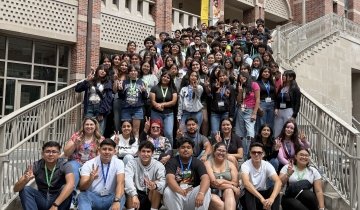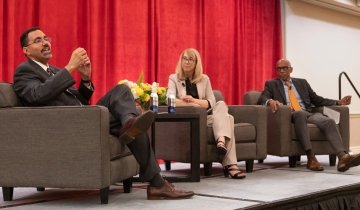In 2016, laying out the plan for the USC Race and Equity Center, center leaders included a vision for an online racial equity tool that would help diversify colleges and universities.
On Monday, the center took the first major step toward fulfilling that vision, unveiling a networking platform for racially and ethnically diverse higher education professionals, dubbed PRISM.
Center leaders say PRISM will offer people of color the opportunity to develop professional relationships, find community and advance careers.
"Equality is putting a job ad on a website or in a print publication and people may or may not see it," said Shaun R. Harper, the center's executive director and Clifford and Betty Allen Chair in Urban Leadership at USC Rossier. "Equity is going to where people of color are and ensuring that they see your job, that you have an opportunity to message your potential interest in them or communicate to them that you think they might be a good match for your institution."
Aligning leadership with students
Research shows longstanding differences between staff and faculty diversity and the demographic makeup of students at universities. And the discrepancies often become even more obvious farther up the chain of command.
"Scholars tell us that too often people of color are underrepresented in positions of influence and positions of power, such as presidencies, deanships, senior level administrators and faculty," said Wilmon Christian, director of PRISM.
PRISM will have services both for individual job-seekers and for hiring institutions. Individual users will have the opportunity to build profiles, search employment opportunities and build relationships through PRISM groups. Institutions will be able to post career opportunities, but also access professional learning modules developed by the USC Race and Equity Center to explore topics related to inequity in hiring, such as implicit bias. Individuals will have similar opportunities for development, including modules and live discussions around such topics as giving PhD job talks or improving a résumé.
Christian said that the site was built to be responsive to institutional needs as well.
"We designed this site so that it will evolve and grow," Christian said. "If we're hearing from institutions that they want to see a new analytic or different metrics to help close equity gaps, we designed the site so that we can incorporate new data."
PRISM opens to individual users on Dec. 5, and to institutions in January.





